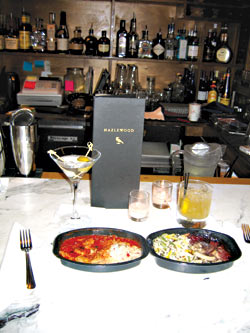By all appearances, the luxuriantly worded menu at downtown Ballard’s Hazlewood looks to be right up area organic chef Brad Hole’s herb-encrusted alley. “Thai style chicken in a red pepper sauce with basil, coconut milk, soy sauce, and ginger,” reads the slender menu’s fourth entry, priced at $12. “Served with white rice.”
Hole is visiting Hazlewood for a bite, on a night off from his own freelance cooking ventures. An earth-friendly business-products vendor by day, he teaches semiregular weekend cooking classes sponsored by Sustainable Ballard, and harvests delicious daily yields of multicolored eggs from his backyard chicken coup. (Full disclosure: Maybe six years ago, Hole and I recorded a five-track karaoke EP at now-defunct Leilani Lanes under the band name the Double Greyhounds.) Tonight, clutching a rum cocktail dubbed the Dark & Stormy, Hole spreads a white napkin across his meaty thighs and sets his fork to his smoldering entrée.
“The Uncle Ben’s rice kind of pulls the moisture out of the whole dish,” he says. “Either that or the plastic.”
Uncle Ben’s? Plastic? Say what?
Turns out, the ornately described dish on the menu isn’t nearly as delectably handcrafted as it sounds. In fact, it’s an 8.25-ounce LeanCuisine, available at area frozen-food aisles for about $3. This is what passes for the required “full meal” these days at sauce-centric establishments—which is A-OK with increasingly sympathetic state liquor officials.
“At one point, we had very strict requirements not only for the menu but for the kitchen,” explains Washington State Liquor Control Board Communications Director Bob Burdick. “Liquor Control officers were having difficulty enforcing some of the more stringent requirements related to kitchen equipment and layout, and we found it really made no sense to require a full commercial kitchen when meals could be prepared using a convection oven or microwave.”
Thus, in 2000, the requirement that restaurant-bars have a full commercial kitchen was stricken from state code. This modification formalized a gradual relaxation of food-preparation standards that began in the late 1990s. To wit, the amount of hard booze licenses in Seattle has skyrocketed since 1997 (from 474 to a 2005 tally of 753), and taverns serving only beer and wine have become an endangered species (from 161 in 1997 to just 49 in 2005).
A short stroll down Ballard Avenue from Hazlewood, Conor Byrne bartender Alana King does a double take as she is asked to nuke a tray of Marie Callender’s Country Fried Chicken & Gravy, also sold for $12 (price at QFC: $4.29). As she pulls on a pair of clear plastic gloves while Blondie plays on the house stereo, King confesses that this is the first time she has had to prepare an entrée since her Irish pub graduated to a full-spirits license a couple months ago. Here, Hole’s assessment is more forgiving.
“It’s definitely no chicken fried chicken,” he says, referring to a popular dish served at the nearby Hattie’s Hat. “But if you’re too drunk to fucking walk that far, it’ll do. Plus, the sous-chef wears gloves, so it’s a little more sterile.”
It hasn’t always been this lax, according to Hazlewood co-owner and lead bartender Drew Church. “Until about a year ago, [Liquor Control Board agents] would give you a hard time about it,” says Church, who tended at Hattie’s prior to opening his own joint. But in 2006, the state amended a stipulation that required bars to serve five full meals.
“The practice of serving four complete meals instead of five was confirmed in a rule-making procedure,” affirms Burdick. “This allowed restaurants to focus on meals rather than on the fifth dish required, which was a sandwich.”
In essence, this modification allowed hooch-slinging music venues like the Tractor Tavern to cease preparing barbecue sandwiches from scratch and go full-micro. Hungry-Man is the Tractor’s boxed brand of choice. Moreover, it’s also perfectly kosher to sell these “meals” at prohibitively exorbitant prices, so as to fully focus on the bottle.
Still, some hungry men remain undaunted.
“I sell about one every six weeks,” says Church. “It’s usually someone who thinks it’s funny.”








